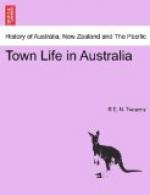The average quality of the acting on the Australian boards is by no means good. The difference between first and second rate art is not understood by a sufficiently large number of people to make it profitable for such companies as the Bancrofts, and Messrs. Hare and Kendall’s, or stars of the first magnitude, to come out here. Since Ristori was here in 1874, Scott-Siddons, Creswick and Rignold, have been the best known actors we have seen; although Marshall’s Quilp, Vernon’s Bunthorne, and Hoskins’s Touchstone, were impersonations of a high-class. Soldene, curious to say, did not hit the popular taste. The cardinal fault of colonial acting seems to me to be exaggeration. Most of our actors are artificial and stagey; even those who clear themselves of these faults seem to play down to the understanding of their audience. The ‘star’ system is as prevalent as in England. The stock companies are for the most part very poor. Pieces which require a large number of persons on the stage of course suffer. Colonial supernumeraries can only be compared with those at country theatres at home. Considering the circumstances, however, the scenery and mounting are as a rule most creditable. The last two years, especially, there has been a great improvement in this department. Melbourne is decidedly the theatrical centre of Australia. It has twice as many theatres as Sydney; most pieces are brought out there for the first time in the colonies; its audiences are more appreciative and critical; its stock companies are better. If a piece succeeds in Melbourne, its success everywhere else is assured.
Whether it is on account of the warmer climate I do not know, but certainly the colonists are a more musical people than the English. Of course I do not mean that there are any considerable number of people here who really understand classical music, or who play any instrument or sing really well. On the contrary, as I think I have said in some other connection, there is no part of the world where you hear so much bad music, professional and amateur. But it is also true, that there are few parts where you hear so much music. Almost every working-man has his girls taught to strum the piano. Amateur concerts are exceedingly popular. Most young people think they can sing, and Nature has certainly endowed the young colonials with, on the average, far better and more numerous voices than she has bestowed on English boys and girls. Sometimes when you are bored in a drawing-room by bad music and poor singing, you are inclined to think that the colonial love of music is an intolerable nuisance. Especially is this the case with me, who have been constantly interrupted in writing by my neighbour’s daughters strumming the only two tunes they know—and those tunes ‘Pinafore,’ and ’Madame Angot.’ But if you are out for a walk on a summer’s evening, and look into the windows of working men’s cottages, you will see the old folk after their day’s labour gathered round the piano in the sitting-room to hear their daughters play. I cannot hold with those who think a working-man’s daughter should not learn music. Their reasoning is illogical—for being able to play the piano is in itself harmless, and may keep the girl out of mischief. Further, it gives a great deal of pleasure to her parents and friends, and often to herself as well.




